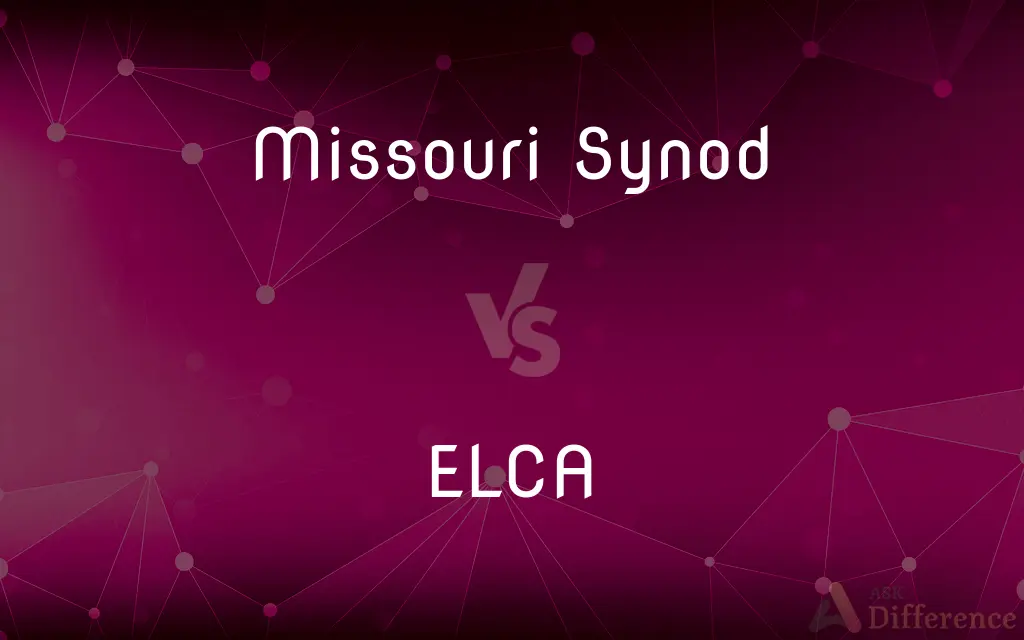Missouri Synod vs. ELCA — What's the Difference?
Edited by Tayyaba Rehman — By Fiza Rafique — Published on November 15, 2023
Missouri Synod (LCMS) is a conservative Lutheran body, while ELCA (Evangelical Lutheran Church in America) is a more liberal Lutheran denomination.

Difference Between Missouri Synod and ELCA
Table of Contents
ADVERTISEMENT
Key Differences
Missouri Synod and ELCA are both significant Lutheran denominations in the United States. Missouri Synod, or the Lutheran Church–Missouri Synod (LCMS), is traditionally more conservative in its beliefs and practices. On the other hand, ELCA, which stands for the Evangelical Lutheran Church in America, tends to have more liberal theological stances.
Differences between the Missouri Synod and ELCA can be observed in their views on various social and doctrinal issues. For example, the Missouri Synod holds a more traditional view on issues like same-sex marriages and ordination of LGBTQ individuals, typically opposing them. In contrast, the ELCA has shown acceptance towards same-sex marriages and has ordained LGBTQ clergy.
When it comes to liturgy and worship style, both denominations can vary widely, but the Missouri Synod congregations often lean towards more traditional worship forms. In contrast, ELCA congregations might exhibit more flexibility and contemporary styles in their services.
Historically, the Missouri Synod was established in the 19th century by German immigrants, emphasizing doctrinal purity. ELCA, however, was formed in 1988, resulting from a merger of three Lutheran bodies, and has since been recognized for its emphasis on inclusivity and social justice.
While both denominations share core Lutheran beliefs, such as justification by faith alone, their approach to biblical interpretation sets them apart. The Missouri Synod tends to adopt a more literal interpretation, whereas the ELCA leans towards a more historical-critical method.
ADVERTISEMENT
Comparison Chart
Founding Year
Established in the 19th century.
Formed in 1988.
Theological Stance
More conservative.
More liberal.
Views on LGBTQ+ Ordination
Opposes ordination of LGBTQ individuals.
Allows ordination of LGBTQ individuals.
Biblical Interpretation
Tends towards literal interpretation.
Leans towards historical-critical interpretation.
Major Emphasis
Doctrinal purity.
Inclusivity and social justice.
Compare with Definitions
Missouri Synod
Holds to a literal interpretation of the Bible.
The Missouri Synod emphasizes the inerrancy of Scripture in its teachings.
ELCA
The largest Lutheran denomination in the U.S., known for liberal theological positions.
ELCA congregations are found all across the country, serving diverse communities.
Missouri Synod
Known for its emphasis on doctrinal purity.
Debates within the Missouri Synod often focus on maintaining doctrinal consistency.
ELCA
Accepts and ordains LGBTQ clergy and recognizes same-sex marriages.
The ELCA's stance on LGBTQ rights has been a topic of discussion in recent years.
Missouri Synod
A major Lutheran denomination in the U.S. with conservative theological stances.
The Missouri Synod has a rich history of maintaining traditional Lutheran beliefs.
ELCA
Abbreviation for Evangelical Lutheran Church in America.
He was ordained as a minister in the ELCA last year.
Missouri Synod
The Lutheran Church–Missouri Synod, abbreviated LCMS.
She belongs to a congregation that is part of the Missouri Synod.
ELCA
Formed in 1988 from the merger of three Lutheran bodies.
The formation of the ELCA was a significant event in American Lutheran history.
Missouri Synod
Founded by German immigrants in the 19th century.
The Missouri Synod's origins trace back to the efforts of German Lutheran immigrants.
ELCA
Emphasizes inclusivity, social justice, and a historical-critical interpretation of the Bible.
The ELCA often engages in social justice initiatives and community outreach.
Common Curiosities
Do both denominations share core Lutheran beliefs?
Yes, both denominations uphold foundational Lutheran teachings but differ in their interpretations and applications.
What are the Missouri Synod and ELCA?
Both are prominent Lutheran denominations in the U.S., with Missouri Synod being conservative and ELCA being more liberal.
Which denomination is older, the Missouri Synod or ELCA?
The Missouri Synod was established in the 19th century, while the ELCA was formed in 1988.
How does the Missouri Synod view LGBTQ clergy ordination?
The Missouri Synod traditionally opposes the ordination of LGBTQ individuals.
How does the Missouri Synod interpret the Bible?
The Missouri Synod leans towards a more literal interpretation of the Bible.
Are the worship styles different between the Missouri Synod and ELCA?
While both can vary, Missouri Synod congregations often lean more traditional, whereas ELCA congregations might have more contemporary elements.
What is the official stance of the Missouri Synod on social issues?
The Missouri Synod holds conservative stances on many social issues, including same-sex marriage and abortion.
Which denomination has a larger membership in the U.S.?
As of my last update in 2022, the ELCA is the largest Lutheran denomination in the U.S.
Was the ELCA formed from other Lutheran groups?
Yes, the ELCA resulted from a merger of three Lutheran bodies in 1988.
What's the stance of the ELCA on same-sex marriages?
The ELCA recognizes and supports same-sex marriages.
Do the Missouri Synod and ELCA collaborate on any projects?
While they operate independently, there have been instances of collaboration on certain humanitarian or social projects.
Which denomination is more prevalent in the Midwest?
Both denominations have a strong presence in the Midwest, but specific prevalence can vary by state and region.
Which denomination emphasizes social justice more prominently?
The ELCA is particularly recognized for its emphasis on inclusivity and social justice.
How do the Missouri Synod and ELCA approach global missions?
Both denominations are involved in global missions but may have different focuses and methodologies.
How does the ELCA interpret the Bible?
The ELCA generally adopts a historical-critical approach to biblical interpretation.
Share Your Discovery

Previous Comparison
Social Science vs. Social Studies
Next Comparison
Electoral Vote vs. Popular VoteAuthor Spotlight
Written by
Fiza RafiqueFiza Rafique is a skilled content writer at AskDifference.com, where she meticulously refines and enhances written pieces. Drawing from her vast editorial expertise, Fiza ensures clarity, accuracy, and precision in every article. Passionate about language, she continually seeks to elevate the quality of content for readers worldwide.
Edited by
Tayyaba RehmanTayyaba Rehman is a distinguished writer, currently serving as a primary contributor to askdifference.com. As a researcher in semantics and etymology, Tayyaba's passion for the complexity of languages and their distinctions has found a perfect home on the platform. Tayyaba delves into the intricacies of language, distinguishing between commonly confused words and phrases, thereby providing clarity for readers worldwide.
















































